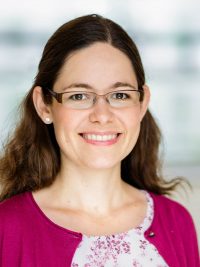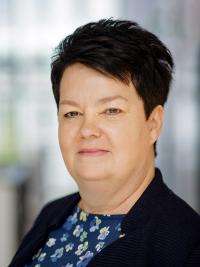In the bachelor's degree programme information studies, you learn to organise large and complex amounts of data and present them in a way that is usable for everyone. Information processes are analysed and controlled using various methods and tools. Project work and internships provide a sound insight into your future professional life. As a trained data and information specialist, you can be used wherever information and data have to be managed.
Information Studies (BA)
Profile
Organise and control information processes
Life without digital media is unimaginable today. There is now hardly an area of public and private life that can do without information and web technologies: mails, documents, image files, videos, etc.
In the information studies degree programme, you will learn methods and tools to structure, organise, prepare and make retrievable this flood of digital information and data. The examination of information technologies is therefore substantial study content. Among other things, this concerns application systems, web and search technologies.
As an information manager, you will learn how today's information society behaves, and also how to responsibly deal with sometimes sensitive data. For this reason, information ethics is an important component of the interdisciplinary subject information studies. Since you will work with very different people in your professional life, social competence is required, which you will test and practise during your studies with 30 fellow students in numerous group work, projects and internships.
You want to apply? Begin your career now in a world full of innovations!
Is this degree programme right for me?
The bachelor's degree program in Information Studies at University of Applied Sciences Potsdam suits you if you are enthusiastic about information technologies and enjoy dealing with complex topics. Dealing with sensitive data requires the ability to concentrate and diligence. If you are also empathetic and communicative, you will enjoy working with various experts in your daily work.
You bring these qualities with you
- Curiosity and willingness to experiment with new digital technologies
- Interest in the organisation of digital data and information
- Structured and abstract thinking skills and enjoyment in dealing with complex topics
- Analytical and communication skills
- Motivation to learn, to accompany complex information projects from analysis to conception and implementation
- Team spirit
Online Study Choice Assistant
Would you like to find out more about the information studies degree programme, get opinions and tips from students and lecturers or take a look at typical study tasks?
With the Online Study Choice Assistant (OSA) you can test whether the degree programme is right for you.
Podcast of the Campus Specialists
Elias and Tim study information studies and inform prospective students about their degree programme as campus specialists. In the podcast, they share their personal impressions of student life and their degree programme.
Contact
The colleagues at the student counselling service provide information to prospective students, first-year students, parents, teachers and students on all general questions about studying. If you have specific questions or concerns about the Bachelor's degree programme in information studies, please contact the subject counselling service.
Subject Counselling Service

Prof. Dr. Julia Maria Struß
These degree programmes might also interest you
More courses| Degree programme | Teaching language | Start of study | Application deadline | |
|---|---|---|---|---|
| |
Archival Sciences (MA) | German | Winter semester | 22/05 – 30/06/ in odd-numbered calendar years (admission restricted)
|
| |
Archival Studies (BA) | German | Winter semester | 15/06 – 15/08 (free of admission)
|
| |
Digital Data Management (MA) | German | Summer semester | Note: No enrolment for summer semester 2024
|
| |
Information Studies (BA) | German | Winter semester | 15/06 – 15/08 (free of admission)
|
| |
Library Sciences (BA) | German | Winter semester | 15/06 – 15/08 (free of admission)
|
Career Prospects
Career prospects
All processes in our digitalised society depend on the availability of data and information. The basic and method-oriented degree programme information studies enables you to work in a variety of institutions and companies and is increasingly in demand. Due to increasing demands in this professional field, graduates are in great demand.
Public and scientific institutions
- Documentation departments and archives in media institutions (e.g. press and broadcasting)
- Picture and news agencies
- Parliamentary documentation in the Bundestag and state parliaments
- Museums
- Libraries
- Information supply in public research institutions
- Public authorities (e.g. e-government, document management, web editing and social media management)
Private companies
- Commercial enterprises with information services (e.g. content management or social media management)
- Internet service providers such as web agencies, digital marketing agencies
- Software producers and database producers
- Information and knowledge management departments
- Web agencies for search engine optimisation
- Information supply in private research institutions
- Management consultancies (e.g. organisational and IT consultancy)
Briefly presented: Possible occupational fields
Study Content
Course of studies
The Bachelor information studies is a full-time programme with seven semesters, including a six-week internship and practical semester. The programme consists of basic compulsory, elective and flex modules.
|
Semester 1 – 2 |
Basic studies, six-week internship |
| Semester 3 – 4 | Integrative and subject-specific specialisation |
| Semester 5 | Practical semester |
| Semester 6 – 7 | Subject-specific specialisation, projects, Bachelor's thesis |
In the information studies programme, students can choose from the following three specialisations in the fourth semester:
a) Study focus: Web Content Management and Digital Marketing, consisting of the modules:
- WD 03 - Website Design and Usability
- WD 05 - Digital Marketing and Analytics
- WD 06 - Website Development
b) Study focus: Data Modelling and Management, consisting of the modules:
- WD 04 - Data Management - Advanced
- WD 09 - Data Mining
- WD 10 - Semantic Technologies
c) Study focus: Information and Knowledge Management, consisting of the modules:
- WBD 01 - Knowledge Management - Fundamentals
- WD 07 - Knowledge Management - Practice
- WD 08 - Document Management
Study content
In the currently valid module handbooks and study and examination regulations of the information sciences department you will find the module overview, a detailed description of the modules and study contents as well as the study plan for the information studies degree programme.
Teaching formats
To ensure that the knowledge transfer also fits the respective topic and that the students' daily study routine is varied, we work with different forms of learning in the information studies degree programme.
- Seminars, workshops (special seminar form)
- Lectures
- Exercises in smaller groups
- Work in PC pools
- Practical projects, sometimes with external partners
Integrative modules
- Start me up
- Basic concepts and practices of information science
- Copyright and basics of internet law for information institutions
- Project Design
- Lab: Data Literacy
Compulsory modules
- Basics Semantics and Metadata
- Fundamentals of Mathematics and Computer Science
- Introduction to professional fields and information research
- Basics of indexing
- Web Technologies and Information Systems
- Information Management
- Modelling
- Management Methods
- Data Management - Basics
- Information Retrieval and Text-based Methods
- Lab: Conceptual design and development of an information system
Elective modules
- Semantic Data Models
- Introduction to object-oriented programming
- Website design and usability
- Data Management - Advanced
- Digital Marketing and Analytics
- Website development
- Knowledge Management - Practice
- Document Management
- Data Mining
- Semantic Technologies
Integrative and partially integrative elective modules
- Digital Editions
- Openness in the Information Society
- Data and information visualisation
- Teaching data and information literacy
- English in Information Services
- Knowledge Management - Basics
- Fair data management and long-term archiving
- FLEX Modules
- PRO: Project
Excursions
Depending on current topics and cooperation partners as well as respective offers for visits and specialist conferences
Internships & Projects
- Two internships: six weeks after the 2nd semester and 20 weeks in the 5th semester
- Two projects (4th semester and 6th - 7th semester)
Information on internships in the Bachelor's programme at the information sciences department
Thesis
- Independent writing of a Bachelor's thesis and its defence
What distinguishes the Bachelor of information studies from neighbouring degree programmes?
In the first two semesters, information and communication science students have some courses in common with the archives and library science programmes, as initially they are taught the basics of information science, which are relevant for all three programmes. In the following semesters, the individual degree programmes become more and more specific.
Archive
This degree programme deals with the preservation and utilisation of documents of historical value. The focus here is on the formation of the cultural and legal-administrative memory of a society. The study content includes archiving methods and history, but also information technologies, the latter, however, to a lesser extent than in the information studies degree programme.
Library Sciences
The degree programme specifically prepares students for work in academic and special libraries, e.g. at universities, research institutions, parliaments, courts, museums and associations. Here, too, the indexing and provision of objects such as books with the help of information technologies, but also other subject areas such as information mediation play a role.
Computer Science
The information studies degree programme has a certain proximity to computer science, especially to the field of business informatics, but also includes a good share of humanities topics. Here, it's less about programming and more about processes and large amounts of data, which you learn to analyse and manage with suitable methods and application systems. Study contents that overlap with computer science are, for example, the basics of programming, data modelling and databases, web technologies, information systems, web development, semantic technologies, information retrieval as well as text and data mining.
Application & Contact
At a glance
The most important deadlines, dates and admission requirements for the Bachelor's degree programme in information studies are compiled here. You can find out which steps you need to take for a successful application in the next section.
Deadlines & Dates
- by 15 August: apply for matriculation
- By 15 July: apply for a higher semester in order to continue a degree programme you have already started at the University of Applied Sciences Potsdam.
Access requirements
- General university entrance qualification according to the Brandenburg university act: General higher education entrance qualification or entrance qualification for studies at universities of applied sciences or previous vocational training recognised as equivalent
This is how you apply!
Do you have a university entrance qualification? Then you have the opportunity to submit an enrolment application for the winter semester from 15 June to 15 August on the MyCampus university portal of the University of Applied Sciences Potsdam.
Once you have submitted your online application for enrolment, submit the completed application, printed and signed, together with all required documents in paper form. The date of receipt at the University of Applied Sciences Potsdam is decisive.
Documents to be submitted
- An officially certified copy of your university entrance qualification or university degree certificate
- Electronic notification of your insurance status for the statutory health insurance for students or electronic notification of exemption from the statutory insurance obligation
- Proof of payment or order confirmation of the semester fee
- Photograph for the issue of the Campus.card
- If applicable, certificate of exmatriculation from the last university attended
Please refer to the enrolment application form to find out whether you need to submit any additional documents.
Do you have questions about the enrolment process at the University of Applied Sciences Potsdam? We have compiled frequently asked questions and answers regarding enrolment and admission.
Start your studies
After you have successfully completed the application process, we recommend that you take a look at the start of studies page of the information sciences department. There you will find important information and dates regarding the start of your studies at the University of Applied Sciences Potsdam.
Further information
The following links provide you, and especially international applicants, with further information on the topics of application and enrolment at the University of Applied Sciences Potsdam.

International applicants
You would like to apply for studies from the first or a higher semester and have acquired your school-leaving qualification and/or university degree abroad? Then you can have degrees and achievements acquired abroad recognised and study with us.

Application & Enrolment Procedure
The application and study service provides information and advice on general questions regarding the application process, admission and enrolment at the University of Applied Sciences Potsdam, application for a higher semester, but also on topics such as compensation for disadvantages, part-time studies, waiting semesters and hardship applications.
Application & Enrolment University of Applied Sciences Potsdam
Contact & Services
The student counselling service provides information and advice on general questions about studying as well as on topics such as choosing a degree programme, application, enrolment and study organisation.
For subject-specific questions on module contents, credit transfer, examinations or specialisations in the information studies degree programme, the subject counselling service is the right place to go.
Student Counselling Service

Prof. Dr. Julia Maria Struß
Study and Examination Service
Study Info Service
studien-info-service@fh-potsdam.de
bewerbungs-service@fh-potsdam.de
campuskarte@fh-potsdam.de
Study Service
studien-service@fh-potsdam.de
Exam Service
pruefungs-service@fh-potsdam.de
Family Affairs Commissioner
Office hours
Tue and Thu 9.30 am – 1.30 pm
Commissioner for University Employees with Impairment
Office hours
by arrangement
Contact Persons Department of Student Affairs



